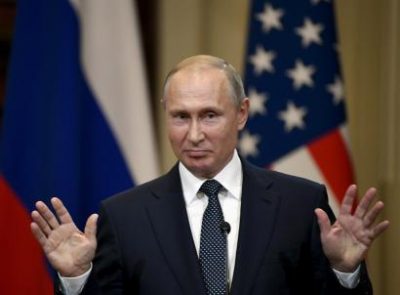Trump Goes to Paris: Will He Make Peace with Putin and Erdogan?

Trump and over 60 other world leaders will be in Paris over the weekend to attend an event commemorating the end of World War I a century ago, during which time the American leader is expected to have important sideline discussions with his Russian and Turkish counterparts. The occasion comes at a convenient time given the urgent need that Presidents Putin and Erdogan have to talk with Trump.
Concerning American-Russian relations, the Kremlin is very concerned about the US’ planned withdrawal from the 1987 Intermediate-Range Nuclear Forces (INF) Treaty which it claims will upset the strategic nuclear balance between the two, while American-Turkish relations are undergoing an incipient rapprochement after the release of a jailed pastor who was accused of espionage and the beginning of joint military patrols in the north Syrian town of Manbij.
At the same time, Russian-Turkish relations are better than at any period in history, and the two countries cooperate real closely in Syria and on the Turkish Stream gas pipeline to Europe. They also have a shared interest in presenting a united front against the US’ reimposition of sanctions against Iran, which directly affects both of them because of the deep level of economic cooperation that they each have with the Islamic Republic. Another important point of convergence between them that’s relevant to the US is their leading roles in the Astana peace process, which America has increasingly begun to politicize by previously threatening to tighten sanctions against Syria in response to what it feels is a lack of tangible progress on this front. Just like with Iran, the shadow of so-called “secondary sanctions” also looms large in this regard.
Therefore, as it stands, the following tasks have been set: President Putin wants to figure out what happens after the INF is scrapped and also prepare the itinerary for his much larger official summit with Trump during the G20; President Erdogan wants to continue Turkey’s rapprochement with the US; both multipolar Great Powers want to present a united front vis-à-vis Iran and Syria; while Trump will probably want to continue dealing with them on a bilateral basis in order to more effectively “divide and rule” Eurasia by possibly trying to cut deals with each of them to that effect. For as tricky as this diplomatic “balancing” act might sound, it’s a positive omen that the reason for their larger gathering is to commemorate the end of World War I, which will hopefully imbue each of them with a positive spirit that makes it easier to reach pragmatic working agreements.
*
Note to readers: please click the share buttons above. Forward this article to your email lists. Crosspost on your blog site, internet forums. etc.
This article was originally published on Eurasia Future.
Andrew Korybko is an American Moscow-based political analyst specializing in the relationship between the US strategy in Afro-Eurasia, China’s One Belt One Road global vision of New Silk Road connectivity, and Hybrid Warfare. He is a frequent contributor to Global Research.

